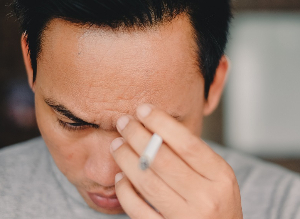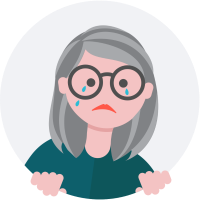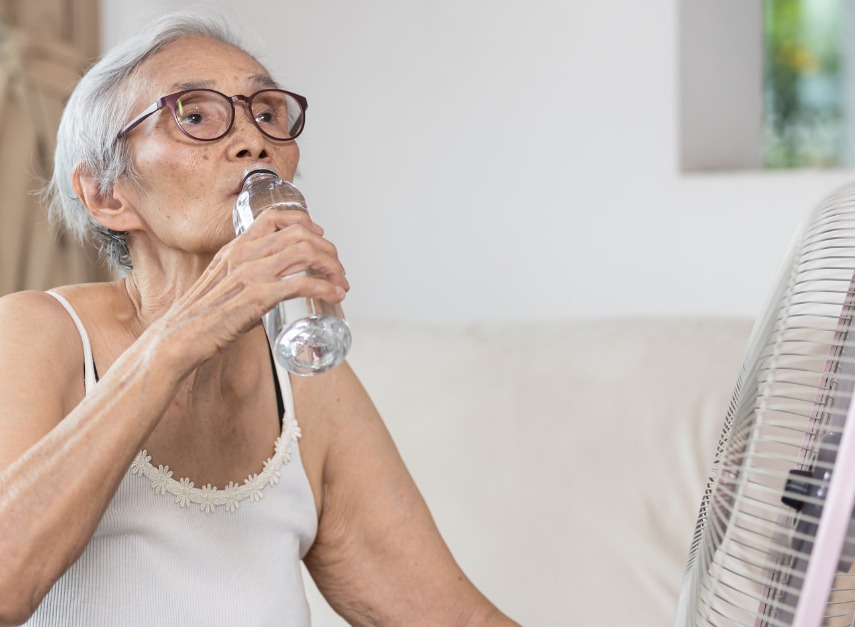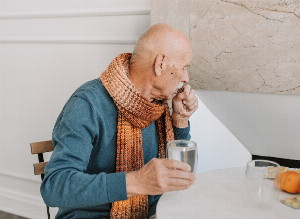COPD diagnosis: Carenity members tell their story
Published Nov 11, 2019 • By Lee Ruiz
Carenity members affected by COPD have graciously told us about their journey with their COPD diagnosis! Symptoms, emotions, tests and examinations, medical care, treatments... read their story with their diagnosis.
Carenity survey of 162 patients across the Carenity platforms.


A majority of the patients waited more than a year and consulted with 2 or more doctors before being accurately diagnosed.
Unfortunately for those living with COPD, the time period to arrive at a diagnosis after experiencing symptoms was an average of 4 years. 20% of patients who participated in this survey received a diagnosis in less than a year from initial onset of symptoms; 80% of respondents received a diagnosis after more than a year.
During this period, respondents experienced varying symptoms with different severities. However, the majority of patients complained of the following symptoms:
Shortness of Breath| Cough| Fatigue | Wheezing | Chest Pain | Bronchitis
Before the diagnosis: the impact of COPD
We asked our members about the impact the symptoms caused by COPD had on their daily life before reaching a diagnosis, and this is what they had to say:
 Hobbies and activities - 74%
Hobbies and activities - 74%
 Chronic fatigue- 54%
Chronic fatigue- 54%
 Professional life - 51%
Professional life - 51%
 Social life - 51%
Social life - 51%
 Personal Life - 44%
Personal Life - 44%
 Family life - 39%
Family life - 39%
 Chronic pain - 20%
Chronic pain - 20%
Other - 7%
The majority of respondents reported that COPD had the greatest impact on their hobbies/leisure and activities before the diagnosis. 42% of respondents reported that two or less of the above areas of their daily life was impacted by symptoms prior to reaching a diagnosis, while 68% of respondents reported that 3 or more of the above areas of their daily life was impacted. Members in general felt that the symptoms impacted their family life and chronic pain the least.
Before diagnosis, only 19% of respondents did their own research on the internet concerning their symptoms. A majority of those individuals reported using the internet to access information. Some of these members mentioned they typed their symptoms into Google to begin their research, while other said they used medical information sites, such as WebMD.
A majority of respondents did not try any alternative therapies for their COPD, such as homeopathy. Only 14% of the patients that participated in this survey said they did. However, those who did try alternative therapies reported use of homeopathy, "juicing," natural oils, breathing exercises, diets (such as organic food diet without sugars and the paelo diet), acupuncture, and tocosh (a traditional Quechua food prepared from fermented potato pulp), and piper aduncum.
Accuracy of diagnosis
For many diseases, prior to receiving a diagnosis, patients are misdiagnosed several times before being accurately diagnosed. Fortunately with COPD, only 27% of the participating members experienced a misdiagnosis prior to their ultimate diagnosis.
According to those 27%, the common conditions they were misdiagnosed with were pneumonia, asthma, respiratory allergies, pulmonary (lung) infections, chronic pain, and arthrogryposis multiplex congenita.
One member shared this about his journey and frustration with being misdiagnosed: "I spent over 4 months on steroids thinking allergies had gone wild. I ended in the hospital with pneumonia. I was sent to a pulmonologist and did the function tests and was then diagnosed with bronchiectasis. The long time use of the steroids caused such water retention that I ended up with a open sore on my leg. My Dr. was worried about it because it was slow to heal."
The shock of the diagnosis
How did patients react to their diagnosis?
 It wasn’t a shock, I was expecting it - 30%
It wasn’t a shock, I was expecting it - 30%
 I didn’t feel any way in particular - 23%
I didn’t feel any way in particular - 23%
 It was horrifying - 23%
It was horrifying - 23%
 It was brutal - 22%
It was brutal - 22%
 It was a relief - 8%
It was a relief - 8%
I don't remember - 14%
Finding out that you have COPD can be a frightening event, but 23% said they did not really feel any certain way about receiving the diagnosis and 30% said they were expecting it!
The role of doctors and healthcare professionals
The role of the healthcare professional making the diagnosis is very important... the care and time the medical professional dedicates to deliver the message to, and answer questions from, the patient is critical to patient satisfaction and understanding of the condition.
Sometimes patients do not feel sufficiently listened to or informed about their condition. The good news is that almost 50% of members participating in the survey felt that their doctor took ample time during their diagnosis to explain everything and ensure everything was understood.

44% - The doctor took ample time to explain everything
41% - The doctor was very calm
27% - The doctor was attentative and emphatic
9% - The doctor offered offered psychological support
A member had this to say about the attention and explanation from his doctor: "He explained that he retained more air than he expelled, that this was a serious problem and the disease was caused by smoking. I had to start changing my life and quitting tobacco."

19%- The doctor seemed like he/she did not care
17% - The doctor was too fast in explaining the diagnosis
7% - The doctor used too much scientific language
19% - The doctor was cold and distant
02% - Other
One member had this to say about their doctor not being empathetic and moving too fast through the diagnosis: "I was in the ER & the Dr came in & told me my potassium level was very low. My liver enzymes were low. Kidney function was low. He told me I had pneumonia. Then he turned to leave the room & turned around & said by the way, did I mention you have COPD?"
Another member had this to say about the doctor no explaining the diagnosis: "I wish he was a little more sympathetic. I wish he had explained things a little more. The way he acted it was like it was an afterthought."
The patient's struggle when facing COPD...
We asked our members how they felt emotionally after receiving their diagnosis, whether they felt renewed with determination now that they had a name for their symptoms/condition, or whether they felt despair for their future medical journey.
This is what the members had to say:
27% of patients felt relieved by the diagnosis, 43% of members felt a great deal of anxiety, and 17% felt shocked and surprised.
Further, 8% felt anger about their diagnosis, 17% reported feeling lost, confused and alone; 17% felt desperate, and 19% of participating patients felt they were being misunderstood.
Fortunately, 30% of participating members felt determined to fight the disease, but only 16% had confidence for the future, with 20% feeling discouraged.
What else did members have to say about their diagnosis?
"I'm not sure what else could have been done. I really like my doctor and feel he has been compassionate and understanding. I know this disease was caused by my smoking --so I have no one to blame but me."
"Reviewing the test results with me was eye opening. I knew what it meant, however, hearing it from a Specialist is disheartening to say the least. He was patient to hear my questions and respond informatively. Having compassion and understanding regardless of how you got there is crucial. Difficulty breathing is frightening. Hearing how to avoid shortness of breath and what to do when an exacerbation occurs is comforting because knowing it's a 'new way of life,' having a medical professional that is understanding makes a world if difference."
What can be done to improve the diagnosis? Any recommendations for medical professionals or for patients?
"The diagnosis should be in words anyone can understand. They should take the time to explain what you will experience and what you could do to help it from progressing too fast. They could show a little compassion too."
"I believe the biggest thing that should be done is to give the patient the information needed to get a grasp on what they are being told. It is a lot to take in and understand at first so a second follow-up visit to again explain the diagnosis and what we can look forward to as far as the progression possibilities of the disease. I have never been good at becoming involved with support groups, but it would be nice to be able to get questions answered or explained as they come up. I still know so very little about what I am dealing with and what I should expect in the future and so I really have no clear idea how to handle anything that may come up in the future."
"More information along with the diagnosis."
"For doctors - be more professional and not worry so much about the salary associated with treating the patient. Treat the patient with respect and humility and have more empathy for the patients. Provide help and listen to the patient. For the patient - leave the consultation with the will to fight and do not be sad."
"Undoubtedly for patients who smoke as I did for so long, I beg you in tears to stop smoking at all cost. COPD has no cure, only a relief from symptoms... your life is worth it."

And what is your story?
Share your experiences and those of loved ones in the comments below to discuss how to improve the diagnosis of COPD!

 Facebook
Facebook Twitter
Twitter




